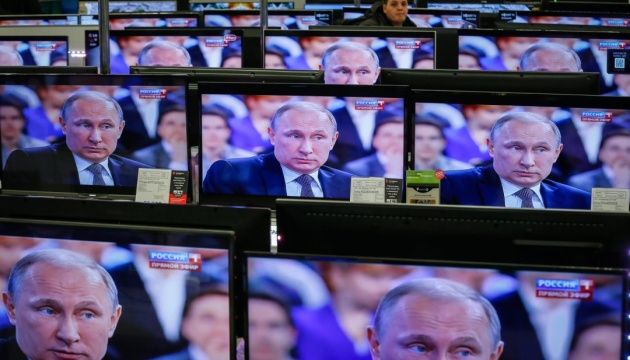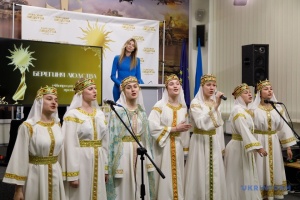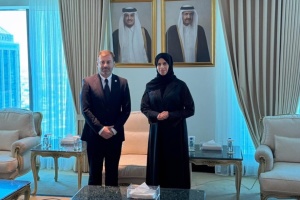
"Red Feathers" of Putin's Parrots
The crisis in EU-Russian relations began in the spring of 2014 - after Russia annexed Crimea and unleashed the war in eastern Ukraine. On the one hand, Russia has repeatedly stated that it will not ask for the cancelation of sanctions and that it is not interested in the collapse of the EU. But the actions suggest otherwise - Russia is gradually taking measures to split and weaken the EU countries, deprive Ukraine of support. After all, in the absence of a single vision, it is very easy to get permission for the construction of the Nord Stream 2 gas pipeline and achieve a weakening or complete lifting of sanctions.
Western Europe, which is just beginning to understand the real threat of a hybrid war, is still not ready to admit that democratic values and high ideals that have been cherished and strengthened for many years have already turned into tools in the struggle against Europe itself.
Over a dozen states and "state entities" have appeared in different parts of the world over the past decades. The first ones were created mainly after the collapse of such countries as the Soviet Union and Yugoslavia, whereas others were formed due to separatism, annexation or occupation of territories. Russia achieved significant "success" on the European continent in this regard. The scenarios realized in South Ossetia, Abkhazia, Transdniestria, Crimea and Donbas are different and similar at the same time.
If we do not go deep into the theory of the state and international legal aspects, then, roughly speaking, states become states, having historical background and after being recognized by the international community. Historical background is rather a blurred concept, but recognition by other states is a concrete step clearly defined by international law. That is why Russia wants "DPR/LPR" to be recognized, although, like Venezuela, Nicaragua and Nauru, which at one time recognized the "independence" of the occupied Abkhazia and South Ossetia in Georgia, it is not recognizing the "republics" itself. The appearance of "diplomatic" activity, not anywhere in Africa, but in Western Europe, is created for this purpose. The so-called "DPR" tried to open its "honorary consulates" in Helsinki, Turin, Athens, Ostrava, and Marseille. The trial on the "consulate" in Marseille is still ongoing and being delayed. It is unlikely that French judges will help implement this dirty scenario. At the same time, devotion to the letter of the law is not entirely in the interests of France itself, because the postponement of court sessions for various reasons leads to the fact that the so-called "DPR consulate" continues to operate on the territory of the country, creating a very dangerous example for others.
It is also surprising that the "honorary consulate" consists of only the French themselves who are not the last people in society, as well as those who support them. They travelled to Donbas and Crimea and again plan to go there in early May to mark the "independence" of the "DPR" and "deepen France's relations with Crimea." An "official delegation" includes the head of the so-called "DPR consulate in France," Hubert Fayard, a "representative of the DPR consulate in France," Christian Camisuli, a "financier of the DPR consulate in France," Jean-Francois Gindrey, counselor of the Bouches-du-Rhone department Christine Pujol, counsellor of the Aix commune in the Limousin region Christian Borelli, Marignane Mayor Eric Le Disses and his special adviser Jacques Clostermann, who even has the title of "honorary citizen of the DPR." Some of these people were or are in public service in France. They might take vacations and go to the occupied city of Sevastopol, this time to officially open the France Friendship Crimea agency, which has already been declared a "new stage in political, economic and cultural relations between France and Crimea."
The question of who pays for the travel of French citizens to occupied Donbas and Sevastopol, who pays for leasing the premises of the "consulate" and how altruistic and useless their actions are is also very relevant. Of course, this is far from the level of former PACE President Pedro Agramunt, who, with other MPs, was flying on a Russian military aircraft to Syria, as well as the level of representatives of the French parliament, such as a member of the National Assembly, Thierry Mariani, who traveled with his colleagues to the occupied peninsula and said that Crimea belongs to Russia. Private visits, freedom of movement and expression of will...
Separatism has now become a widespread and dangerous phenomenon in Europe. Wealthy regions want to manage their budget, so they want to secede, as was the case with Catalonia and prosperous regions in the north of Italy. Less wealthy regions are striving for self-determination, even though they live on subsidies from the state. The issue concerns, in particular, the French islands of Corsica and New Caledonia. There is also the Basque Country in Spain, Scotland, Flanders in Belgium, South Tyrol, and even Bavaria in Germany. All these regions are or may become carriers of separatism under certain conditions. Large-scale support for separatist ideas is now very unlikely in Bavaria or South Tyrol. At the same time, in Catalonia or Corsica it's enough to pick up the slogans, and millions of people will take to the streets and then vote for independence.
If we take this into account, it's interesting to model the situation – how would it be seen if German or Spanish parliamentarians, representatives of local government, visited New Caledonia or Catalonia and supported secession in their statements? What would be the reaction of the central governments of European countries if their territories seeking independence or autonomy would open "honorary consulates" in other countries, simulating foreign policy activities? Does the opening of an honorary consulate of the Basque Country in Munich or an honorary consulate of Corsica in Rome seem unrealistic? It seemed so until the "DPR" had begun "diplomatic" activity in Europe and in fact received tacit consent, because despite the Vienna Convention, its "honorary consulate," registered as a public organization, but only with a well-modeled name, operates in Marseille.
Another inalienable part of the hybrid war was literature, theater, and cinema. These are instruments of subtle influence on intellectuals, on those who, by virtue of their education, will not believe in cursed boys and the destruction of snigers. But books and films - believe it. I will not speak for other countries, but in France it is very noticeable. The French are by nature prudent and intelligent people, but are ready to actively defend their rights (from where all these strikes and endless protests) and respects alternative points of view, especially those based on their own experience. The main thing is to correctly represent these points of view and experience.
Literature, theater, and cinema have become another integral part of the hybrid war. These are tools of subtle influence on intellectuals, on those who, by virtue of their education, will not believe in "crucified boys" and the "killing of bullfinches." However, they will believe books and films. I cannot say that about other countries, but it is very noticeable in France. The French are prudent and intelligent people, but are ready to actively defend their rights (through all these strikes and endless protests) and respect alternative points of view, especially those based on their own experience. The main thing is to correctly represent these points of view and experience.
A book by DPR fighter Zakhar Prilepin titled "Letters from Donbas. Everything that should be resolved" was presented to French readers at the Paris Book Fair this year as such an "alternative point of view." The "DPR" militant was presented as a "chronicler" of the war, an impartial eyewitness of those events. Only Ukrainian activists who came to the forum dared to tell the truth about this author, accusing Pridepin of murdering Ukrainians.
Another well-known "alternative point of view" is a film by Paul Moreira "Ukraine: The Masks of the Revolution" on which the film director filed a lawsuit against Ukrainian journalist Anna Jaillard-Chesanovska. She translated materials for the movie and accused Moreira of bias.
Other "alternative points of view" include a philosophical novel by Belgian lawyer and writer of French origin Eric Cusas "The Heart of Christian" ("Coeur de Chretien"). But this is not only a plot against Ukraine, but against the whole European community. Eric Cusas, a long-time favorite of the Kremlin, an active right-wing anarchist and EU-skeptic, convinces readers in his novel that the European Union, as a global institution, has lost its relevance and is steadily moving to a decline and that the situation could be remedied by the creation of a new model of a global Europe. There was nothing special at first glance, but an evening debate at which the book was presented was organized by a "French-Russian working group," non-profit association "Cercle du Bon Sens," which not only promotes the strengthening of French-Russian friendship, but also holds anti-Ukrainian events. For example, last year, "Cercle du Bon Sens" together with the "Donetsk French-Russian Institute of the DPR," held a round table discussion "Plumes d'Octobre rouge" ("Red Feathers of October"), during which participants discussed "fake" Ukrainian borders, denied the existence of Ukrainians as a nation, and called them "Little Russians." The head of the organization, Anna Gichkina, intended to open an "honorary consulate" in Strasbourg, similar to the one operating in Marseille, in the city that is the home to the governing bodies of the Council of Europe, the PACE, the ECHR and the European Parliament.
This again shows how subtle and veiled the methods of hybrid warfare may be. After all, neither "tea" nor "conversations" bring anything terrible... at first glance. Where did translator and scientist Gichkina find the funds for organizing such events at expensive restaurants in Strasbourg to promote anti-Ukrainian and now also anti-European ideas? That's a rhetorical question...
Weak initial attempts at outlining and defining a hybrid war and its "weapons" are observed in Europe. The spread of false information, influence on electoral processes and cyberattacks are already noticeable. In particular, the PACE at its latest session passed a resolution under a report "Legal challenges related to hybrid war and human rights obligations." Yes, this is a move forward, but this document, which, in comparison with its absence, is already a breakthrough, and compared to how the events "on the front" of the hybrid war are developing, is a quiet whisper with an expression of "anxiety," complaints about "legal asymmetry" and conducting a hybrid war in the "gray" zone or "on the brink" of the law. The most tragic is that for Western Europe, where honesty, respect for the law and democratic principles are an integral part of the consciousness and perception of everyone, these same high principles are being turned into weapons in the hybrid war. Indeed, how can one punish and oppose what was not defined, what was not legally adopted, what is beyond the high principles and concepts of a developed society. But is it possible to judge the barbarians under democratic laws, which they despise so stubbornly?
Here the insight is inevitable. There is already an example. Britain has become the first country in Europe to feel the non-hybrid blow of the hybrid war - after attempted murder of the Skripals. Others have drawn conclusions from this disappointing lesson. The collective expulsion of Russian diplomats may be followed in the foreseeable future by the creation of a G7 group, which, according to Boris Johnson, "would look at Russian malign behavior in all its manifestations, whether it's cyberwar, whether it's disinformation, assassination attempts, whatever it happens to be, and collectively try and call it out." However, there is no time for reflection and searches. There is only time for action.
Olha Budnyk, Strasbourg




